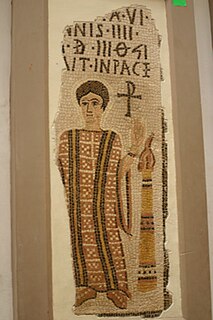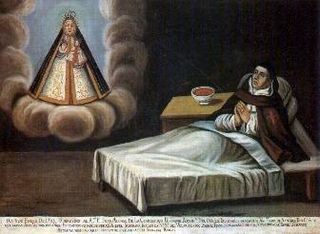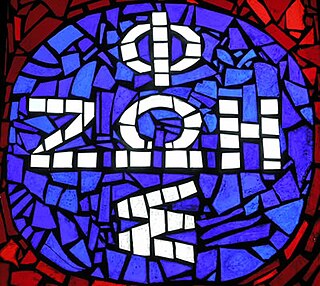
A Christian denomination is a distinct religious body within Christianity that comprises all church congregations of the same kind, identifiable by traits such as a name, peculiar history, organization, leadership, theological doctrine, worship style and sometimes a founder. It is a secular and neutral term, generally used to denote any established Christian Church. Unlike a cult or sect, a denomination is usually seen as part of the Christian religious mainstream. Most Christian denominations self-describe as Churches, whereas some newer ones tend to use the terms churches, assemblies, fellowships etc, interchangeably. Divisions between one group and another are defined by authority and doctrine; issues such as the nature of Jesus, the authority of apostolic succession, biblical hermeneutics, theology, ecclesiology, eschatology, and papal primacy may separate one denomination from another. Groups of denominations—often sharing broadly similar beliefs, practices, and historical ties—are sometimes known as "branches of Christianity". These branches differ in many ways, especially through differences in practices and belief.

The charismatic movement is the international trend of historically mainstream Christian congregations adopting beliefs and practices similar to Pentecostalism. Fundamental to the movement is the use of spiritual gifts (charismata). Among mainline Protestants, the movement began around 1960. Among Roman Catholics, it originated around 1967.

The Focolare Movement is an international organization that promotes the ideals of unity and universal brotherhood. Founded in Trent, northern Italy, in 1943 by Chiara Lubich as a Catholic movement, it remains largely Roman Catholic but has strong links to the major Christian denominations and other religions, or in some cases with the non-religious.

Catholic Charismatic Renewal is a "Current of Grace" within the Catholic Church that incorporates aspects of both Catholic and Charismatic Movement practice. It is influenced by some of the teachings of Protestantism and Pentecostalism with an emphasis on having a personal relationship with Jesus and expressing the gifts of the Holy Spirit.

In Christianity, worship is the act of attributing reverent honour and homage to God. In the New Testament, various words are used to refer to the term worship. One is proskuneo which means to bow down to God or kings.

Chiara Lubich was an Italian bestselling author and spiritual leader, founder, and president of the worldwide Focolare Movement, which works to foster unity and universal fraternity at all levels of society. Lubich is considered one of the most remarkable women in the Roman Catholic Church and one of the most significant leaders in ecumenical, interreligious and intercultural dialogue.

Teachings of Opus Dei are the teachings of the founder of Opus Dei, St. Josemaría Escrivá de Balaguer.
Opus Dei in society refers to the social mission, general social strategy, social activities, work, relationship with politics and other aspects of Opus Dei.

The Neocatechumenal Way, also known as the Neocatechumenate, NCW, colloquially The Way, is a charism within the Catholic Church dedicated to Christian formation. It was formed in Madrid in 1964 by Kiko Argüello and Carmen Hernández.

Francisco José Gómez de Argüello y Wirtz is a Spanish artist and, together with Carmen Hernández, co-initiator of the Neocatechumenal Way.

The Paschal mystery is one of the central concepts of Catholic faith relating to the history of salvation. Its main subject is the passion, death, and Resurrection of Jesus Christ – the work that God the Father sent His Son to accomplish on earth. According to the Compendium of the Catechism of the Catholic Church, "The Paschal Mystery accomplished once for all by the redemptive death of His Son Jesus Christ." The Catechism states that in the liturgy of the Church which revolves around the seven sacraments, "it is principally His own Paschal mystery that Christ signifies and makes present."

The Catholic Church in Israel is part of the worldwide Catholic Church, in full communion with the Holy See in Rome.

Catholic spirituality includes the various ways in which Catholics live out their Baptismal promise through prayer and action. The primary prayer of all Catholics is the Eucharistic liturgy in which they celebrate and share their faith together, in accord with Jesus' instruction: "Do this in memory of me." The Catholic bishops at the Second Vatican Council decreed that "devotions should be so drawn up that they harmonize with the liturgical seasons, accord with the sacred liturgy, are in some fashion derived from it, and lead the people to it, since, in fact, the liturgy by its very nature far surpasses any of them." In accord with this, many additional forms of prayer have developed over the centuries as means of animating one's personal Christian life, at times in gatherings with others. Each of the religious orders and congregations of the Catholic church, as well as lay groupings, has specifics to its own spirituality – its way of approaching God in prayer to foster its way of living out the Gospel.
The Directory of International Associations of the Faithful, published by the Dicastery for the Laity, Family and Life, lists the international associations of the faithful in the Catholic Church that have been granted official recognition. It gives the official name, acronym, date of establishment, history, identity, organization, membership, works, publications, and website of the communities and movements.
This a list of organisations covering Catholic laity. It aims to list ecclesial movements of unspecified standing. For international Catholic movements that have received official approval by the Catholic Church, see Directory of International Associations of the Faithful.

The Light-Life Movement is one of the movements of renewal in the Catholic Church, according to the teaching of the Second Vatican Council. This movement originated in Poland thanks to the efforts of Servant of God Fr. Franciszek Blachnicki.
Iviyo loFakazi bakaKristu is an evangelical and charismatic movement within the Anglican Church of Southern Africa.
Charismatic Christianity is a form of Christianity that emphasizes the work of the Holy Spirit, spiritual gifts, and modern-day miracles as an everyday part of a believer's life. Practitioners are often called Charismatic Christians or Renewalists. Although there is considerable overlap, Charismatic Christianity is often categorized into three separate groups: Pentecostalism, the Charismatic Movement and Neo-charismatic movement. The movement is distinguished from Pentecostalism by not making the speaking in tongues (glossolalia) a necessary evidence of Spirit baptism and giving prominence to the diversity of spiritual gifts. According to the Pew Research Center, Pentecostals and Charismatic Christians numbered over 584 million or a quarter of the world's 2 billion Christians in 2011.












